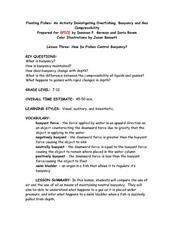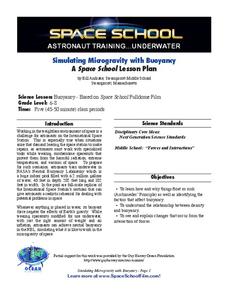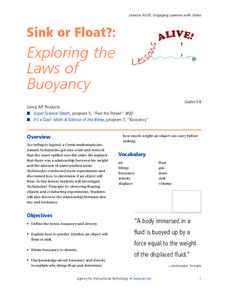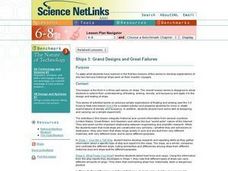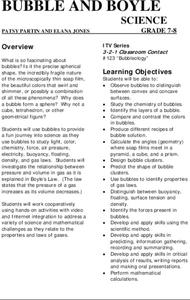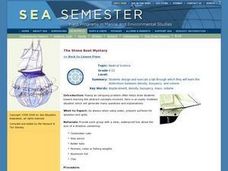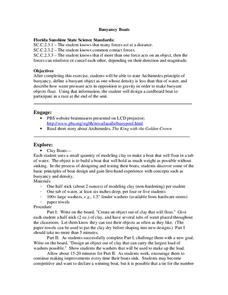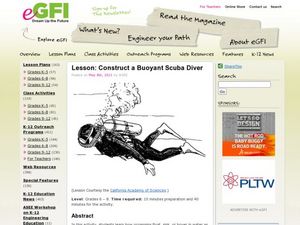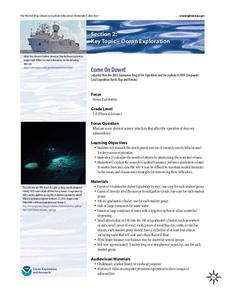Curated OER
Floating Fishes: How do Fishes Control Buoyancy?
Playing with balloons, water, oil, and bottles help put this lesson over the top! Participants use air-filled balloons in water tanks to experience gas compression. They also use oil-filled bottles to experiment with buoyancy. Included...
Curated OER
Buoyancy: Integrating Science and Literature
Integrate science and literature by using the scientific method to test the veracity of the floating peach described in Roald Dahl's James and the Giant Peach. Clips from a Bill Nye: The Science Guy episode about buoyancy frontload...
Florida International University
Simulating Microgravity with Buoyancy
How do astronauts know how to live and work in a weightless environment? It doesn't come naturally! Junior physicists conduct experiments to examine the link between buoyancy and microgravity. Each activity illustrates a different aspect...
Cornell University
Buoyancy
Swimmers know to float by turning their bodies horizontally rather than vertically, but why does that make a difference? In an interesting lesson, scholars explore buoyancy and the properties of air and water. They test cups to see which...
National Sailing Hall of Fame
How a Sailboat Works: Hull Speed and Buoyancy
How can you determine the maximum speed of a sailboat? A sailing presentation included with a straightforward lesson plan prompts learners to calculate the maximum speed of a sailboat with a displacement hull. The presentation continues...
American Physiological Society
How Does the Density of a Liquid Affect the Buoyancy of an Object?
Here's a lesson plan that will really float your boat! Introduce physical science scholars to the relationship between buoyancy and density through an assortment of individual and collaborative exercises. Lab groups work together to...
Florida International University
Designing an Autonomous Underwater Vehicle (AUV): Concepts in Lift, Drag, Thrust, Energy, Power, Mass, and Buoyancy
Engineer an autonomous underwater vehicle (AUV) to study concepts of physics. Using household materials, collaborative groups design and build an AUV and then test Newton's Laws of Motion as they apply them in underwater environments...
Curated OER
Exploring Buoyancy
Students use materials found at a resource table to design simple devices that will house instruments to take water samples from a tub of water. They design 3 instruments, each varying in density so that one will float, one will hover...
Curated OER
Bubble and Boyle
Even middle schoolers still enjoy experimenting with bubbles! They execute a series of experiments enabling them to distinguish between convex and concave surfaces, explore the properties of buoyancy, surface tension, and density,...
California Academy of Science
Buoyancy Bulls-Eye
Why does a seastar sink, but a jellyfish float? Through a fun investigation, learners examine the concept of buoyancy using simple household items. The challenge: create neutral buoyancy for an action figure in water. With ample teacher...
Curated OER
Sink or Float: Exploring the Laws of Buoyancy
Learners explore the relationship between density and buoyancy. After watching a video explaining buoyancy, students discuss displacement and floating. Learners have a raft building competition. Afterward, they conduct experiments to...
Curated OER
Grand Designs And Great Failures
Students extend their understanding of floating, sinking, density, and buoyancy and apply it to the design and testing of ships. students discover that most ships are constructed very similarly-whether they are schooners or destroyers.
Curated OER
Ships 3: Grand Designs And Great Failures
Students engage in this, the third in a three-part series on ships. The overall lesson series is designed to allow students to extend their understanding of floating, sinking, density, and buoyancy and apply it to the design and testing...
Curated OER
Bubble and Boyle
Middle-schoolers still enjoy playing with bubbles! In this series of eight laboratory activities, science learners explore convex and concave surfaces, angles, gas laws, buoyancy, density and more!
Curated OER
The Stone Boat Mystery
Students design and execute a lab through which they study the distinctions between density, buoyancy, and volume.
Curated OER
Will It Sink Or Float?
Learners develop their understanding of buoyancy and density related to sinking and floating. They investigate which objects sink and float through experimentation. They determine that different substances sink or float depending on...
Curated OER
Sink or Float?
Have your class explore density and buoyancy using this resource. Learners read the book Who Sank the Boat, and use several items, such as rubber balls, bottle caps, wood, and other household items to conduct an experiment. Using a tub...
Center for Precollegiate Education and Training
Buoyancy Boats
What did the sea say to the boat? Nothing, it just waved. An inquiry-based lesson starts with a simple concept on the Archimedes Principle and challenges pupils to make something out of clay that floats. Then, they design an object out...
Curated OER
Oceans of Fun
Here is a great hands-on activity that should lead to a greater understanding of salt water, why the ocean is salty, and how ocean waves are formed. This terrific, old-school lesson has clearly described activities, and all of the...
Curated OER
Blowing Ballast
Oceanographers participate in a memorable hands on experience about buoyancy. They build a model of a submersible using a plastic bottle and a balloon. Afterward, they answer assessment questions. An answer key and some terrific...
Curated OER
Sink or Float
Using a variety of objects, learners conduct buoyancy experiments. They make predictions on which object will sink or float and test their predictions. They use a graphic organizer to record their findings.
Curated OER
Construct a Buoyant Scuba Diver
Groups of young oceanographers get to use action figures to experiment with the property of buoyancy! This memorable lesson plan provides detailed background information, a link to the laboratory worksheet, and thorough instruction...
DiscoverE
Foil Boats
How many pennies can an aluminum foil boat hold? That is the challenge in a collaborative activity designed to explore the concept of buoyancy. Learners use aluminum foil to build makeshift boats and test the weight they hold before...
NOAA
Come on Down!
What do we do when a dive is too dangerous for humans to accomplish? Send in the robots! Middle school scientists get acquainted with several different models of submersible robots in the second lesson of six from NOAA. Lab groups then...
Other popular searches
- Density and Buoyancy
- Sink Float Buoyancy
- Eggs and Buoyancy
- Buoyancy Force
- Relative Buoyancy
- Buoyancy Boat Design
- Density & Buoyancy
- Buoyancy and Boats
- Water Buoyancy
- Buoyancy Swimming
- Buoyancy Ideas
- Neutral Buoyancy


